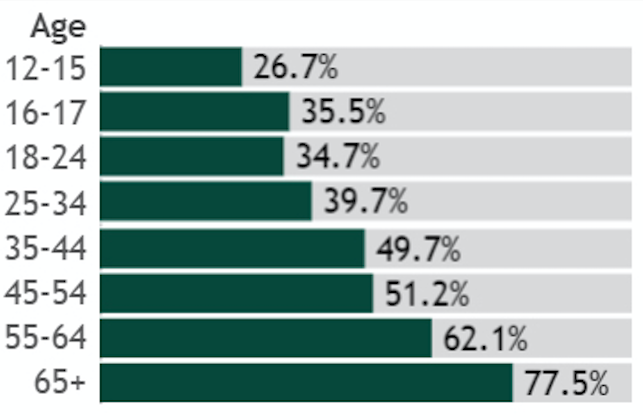By Chris Spangler
Jefferson County’s new cases of COVID-19 are averaging fewer than one per day, and at least half of them likely are due to the Delta variant, a health official says.
“Since late May, we have been averaging about one to two cases a day or less, with recent weeks averaging less than one case per day,” county epidemiologist Samroz Jakvani reported Tuesday. “Over the past several days, we’ve confirmed more cases than usual.”
He cited seven confirmed cases during the past three days, compared to 15 confirmed cases all of July thus far.
“We don’t know exactly how many of these are the Delta variant, but we can expect at least half of them, if not more, to be the Delta variant based on state and national variant proportions,” Jakvani explained. “This is very concerning, as we’ve seen case rates increase very rapidly across the country.”
That is a concern, as a large percentage of Jefferson County’s population has not yet been vaccinated for COVID-19.
In fact, only 37,300 or 44 percent of county residents are fully vaccinated, while 2.1 percent still need to get their second dose or are less than two weeks after their final dose (and are not considered fully vaccinated, though they do experience some protection within a week after their first dose). About 53.9 percent of county residents remain unvaccinated.
Not surprisingly, the most vaccinated age group are residents age 65 and up, at 77.5 percent, while the least vaccinated are teens age 12-15, at 26.7 percent (see chart for all age groups).
Compared to its neighbors, Jefferson County’s vaccination rate is below Dane County, which is at 67 percent; Waukesha County, at 53.6 percent; and Rock County, at 47.6 percent. The county is slightly ahead of two others: Dodge County, with a 39.3-percent fully vaccination rate and Walworth County, at 40.8 percent.
Jakvani advised yet-unvaccinated residents to get vaccinated as soon as possible.
“These individuals are not protected from severe illness from COVID-19, and if they do get infected, they are more likely to infect a larger number of individuals,” he warned.
“Evidence-based strategies that reduce the spread of COVID-19 (masks, physical distancing, quarantining upon exposure) are no longer in effect or are being implemented to a minimal degree, which is especially concerning when we start to see cases rise,” he added.
Jakvani said that he does not yet have enough data to say whether there have been hospitalizations due to the Delta variant.
“It takes three to four weeks to confirm the variant in particular for a case and there are many parameters that make whole-genome sequencing difficult to implement broadly across the state,” he explained. “The best way to gauge this is to assess the hospitalization rate, which has not changed from about 4 to 5 percent.
“Preliminary evidence suggests Delta is only more infectious (up to 70 percent more infectious), but not more severe in terms of disease severity,” he continued.
The epidemiologist said the county has not suffered any additional deaths since the widespread emergence of the Delta variant, so it is unlikely it has experienced any deaths related to it.
Since the pandemic began in March of 2020, 111 county residents have lost their lives to the coronavirus, with another 25 deaths probably caused by COVID-19.
Meanwhile, Jakvani indicated that the fact that only 23.3 percent or about 1,022 of children age 12-15 and 32 percent or about 720 individuals age 16-17 in the county have been fully vaccinated is a concern as the start of the school year nears.
“Progress is currently very slow,” he said of vaccinating teens. “We are working through several avenues to increase vaccination rates for this age group, but these conversations are proving most impactful when they occur with primary health-care providers.
“It is vital that parents talk to their child’s physician about COVID-19 vaccination and we strongly encourage both parents and providers to have that conversation as soon as possible to protect our community,” he added.
As for elementary school youngsters, Jakvani said there currently is no concrete timeframe for COVID-19 vaccination for ages 11 and under. However, he said he expects approval for vaccinating at least a portion of that age group by late 2021 or early 2022.
And regarding for children wearing facemasks at school, he said that the Centers for Disease Control recently recommended that all students who are not vaccinated should wear a mask going forward.
“We have worked with our school district administrators to implement in-person summer school safely, and will continue to work with our school district administrators closely as we near the fall semester to ensure that in-person school can occur safely,” Jakvani stated. “However, it is likely that mitigation measures in schools will be decided at the school level.”
He said that in general, boards of education make these decisions with guidance from the Jefferson County Health Department. That agency, in turn, takes into account vaccination rates, case rates, guidance from the CDC and state Department of Health Services to make its recommendations.
In the meantime, the epidemiologist encourages community residents to stay home when ill, get tested if symptomatic consistent with COVID-19 (or upon exposure), and complete their COVID-19 vaccination.
“Exercise common-sense precautions by physically distancing and masking up in high-risk settings where persons may not be vaccinated,” he said. “We also encourage residents to follow the Health Department on social media and check our COVID-19 dashboard to stay informed on case rates and relevant updates.”

In Jefferson County, only 44 percent of residents are fully vaccinated against the coronavirus. As this chart shows, those age 65 and older have the highest vaccination rate at 77.5 percent, while teens age 12-15 have the lowest, at 26.7 percent.

Jefferson County epidemiologist Samroz Jakvani.
Chris Spangler photo.
This post has already been read 1637 times!
